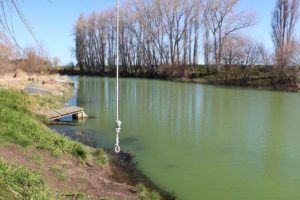Upstream–downstream: wetlands connect us all
Guest blogger: 2008 Montana book-award winner* & Hauraki Islands committee member, Janet Hunt.
World wetland day 2009 approaches. Globally, it’s actually the 2nd of February and is a celebration of the signing of the international agreement for the protection of wetlands known as the Ramsar Treaty. In New Zealand this year most of the events will be over the nearest convenient weekend, 31st January–1 February.
I grew up on a farm immediately adjacent to the bush-line of Mt Taranaki. The farm is crossed by a number of streams and a small river. The waters come direct from the snow, I presume, or maybe from aquifers seeping out from under the mountain. Whatever their source, they are clear, cold and drinkable. To this day, the farm and house take their water supply direct from one of them.
If I follow that stream to the coast, however, I probably won’t be drinking it because along the way it passes through town and across farmland picking up a mixed burden of fertiliser, animal effluent, road runoff and a small degree of rubbish. It’s nowhere as bad as it used to be — we used to swim in a water hole not far from home that was cloudy and probably polluted by cowshed effluent, a practice long-since stopped. Recent years have seen a concerted planting along stream sides to further slow down this contamination so maybe, hopefully, the worst is behind us.
That brings me to the theme of this year’s wetland day: upstream–downstream: wetlands connect us all . It could possibly be subtitled there are no free lunches or what goes around comes around because we are all in some respects downstream, and whether or not we are fortunate enough to be those at the top of the river we share as a society in the degradation and loss that accompanies pollution, sedimentation and pest-invasion (whether botanical or zoological). My niece recently holidayed at Lake Rotoiti: the trip promised much but in reality the water they swam in was turbid and they were hounded by wasps. Lakes are downstream.
We are also upstream whether literally or metaphorically with a responsibility to minimise our impact or, as we currently say, to tread lightly on the earth.
Upstream and downstream: that’s what I’m doing on world wetland day this year. I’m delighted to have a place on a trip up the Waikato River from Hamilton to Taupo and back (by bus, not water). It’s organised by the National Wetland Trust and looks like a long, but fascinating day.
Elsewhere, events are being organised all over the country, many by Fish & Game NZ, others by local groups and individuals — thinking about wetlands, being in wetlands, learning about wetlands, weeding them, cleaning them up, caring for them. And not just wetlands, of course, but the bodies of water they flow into and out of. One day, who knows: I just might follow our stream from the mountain to the coast and when I get there I’ll take a drink — and it will be just as good as the water from the tap up the mountain.
* Janet Hunt was awarded the 2008 Montana Medal for Non Fiction for her book Wetlands of New Zealand – A bitter sweet story.
If you are interested in attended an event on World Wetlands Day – check out these websites.
Celebrate World Wetlands Day in Manukau
Wetland Trust – A tour along the Waikato river

